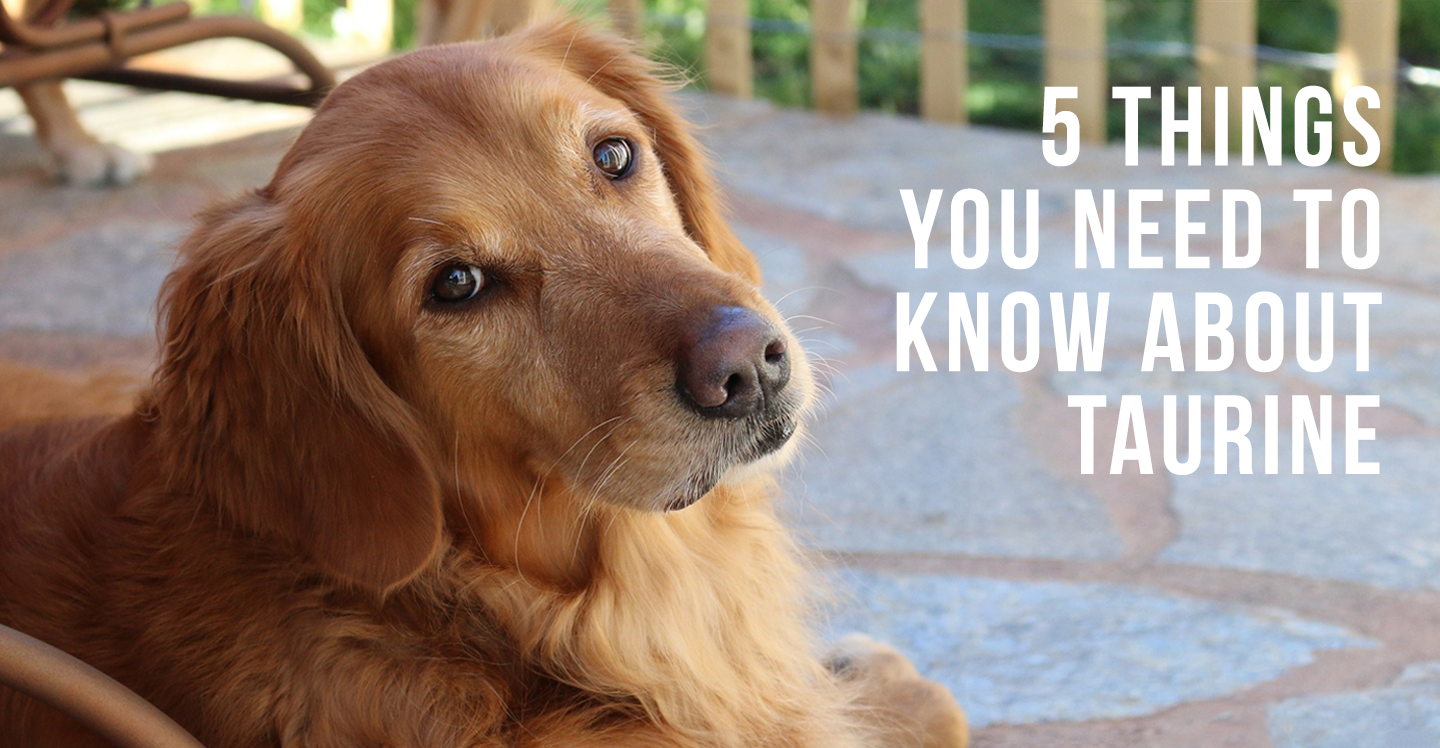
Bandit celebrated his 5th Birthday by chasing younger dogs at the park, chowing down on his pupcake and howling along to a spirited, albeit off-key rendition of “Happy Birthday.” As Bandit’s 8th Birthday neared, he seemed like an entirely different dog. When he played with other dogs, a few laps left him out of breath. Birds who once shrieked and took flight as Bandit bounded towards them, now hopped leisurely to their next meal as he trotted in their direction. Age, of course, is a factor but in the case of Bandit these changes may be more than normal signs of a geriatric dog.
What is going on with Bandit and how does his pet parent take steps to get him closer to acting like his 5-year-old self?
Don’t look any further than Bandit’s food bowl. This pooch isn’t getting the necessary amount of foods that are high in taurine. Here are 5 things you need to know about taurine and how it benefits dogs.
1. What’s taurine?
Taurine is an amino acid. (For those of us who scraped by in biology, amino acids are the building blocks of protein and our muscles.) This amino sulfonic acid helps some of the most crucial systems function properly. Amino acids for dogs help in the same way as they do humans. Taurine aids in cardiac function, eye health, immune system function, and in multiple other systems. Taurine is especially concentrated in the heart muscle and contributes to it functioning properly. Basically, taurine rocks.
2. Why is it important?
Besides, the long list of systems that taurine helps, there’s cause to believe it can benefit animals suffering from Dilated Cardiomyopathy, otherwise referred to as DCM. A heart is a muscle and its main function is to circulate blood. Taurine is the amino acid rockstar friend we never knew we needed. It turns the heart into one mean, blood pumping machine. When taurine levels are low though, the heart becomes weaker and pumps less efficiently (that’s no good). A dog with DCM will have a dilated heart muscle with a bigger heart chamber containing more blood. Because the heart muscle is weaker (taurine is M.I.A.), blood doesn’t circulate through the system the way it should.
Now, back to Bandit and his symptoms to better understand the warning signs associated with DCM.

Bandit was easily out of breath during play and had less energy to do the activities he enjoyed most. These symptoms are an indicator that something wasn’t right.
- Fatigue
- Less Energy
- Heavy Breathing with Exercise
- Coughing
These are all signs associated with DCM. If your furry friend shows any of these signs, please contact your veterinarian immediately. Dilated Cardiomyopathy can lead to heart murmurs, arrhythmia, and fluid in the lungs.
3. How does your pet get the proper amount of taurine?
Taurine can be made in your body from other sulfuric amino acids or it can be eaten. In the case of Bandit, his body wasn’t making enough taurine which is why his pet parent needed to adjust what was put in his bowl.
Taurine levels can be boosted simply by adding (or increasing) meat-based protein in your pet’s diet. Any type of meat will do as long as it’s fresh and good quality (anything you’d be willing to serve on your own dinner table). Organs such as the heart are also high in taurine and are sure to get your pooch drooling.
If you’d prefer not to serve meat raw there are several alternatives. Freeze-dried and dry-roasted meats are both viable options along with air-drying. Meats can also be lightly cooked, emphasis on lightly. Taurine has two weaknesses and one is heat (the other, water).
4. Why kibble just doesn’t cut it.
In order to explain why kibble just isn’t up to snuff, we have to travel back in time, to a decade where denim, big hair and pastels reigned supreme. Hello, 80’s. During this time, a troublesome trend came about that worried a lot of pet parents. Dilated Cardiomyopathy was becoming prevalent in cats. Cats, being true carnivores, really need taurine (which again, is found in meat proteins). Because of the trend, AAFCO, the Association of American Feed Control Officials, decided to make this a requirement in all cat foods, almost eradicating Acquired Cardiomyopathy in cats (wow!). For dogs, it was presumed that they could develop taurine in their bodies with the help of other sulfuric amino acids. (Some dogs can.) Fast forward to today and AAFCO still doesn’t require taurine in dog foods because sulphur-containing amino acids (cysteine and methionine, big words, even bigger job) are included in kibble formulas.
So besides those amino acids, what is included in kibble? The Pet Food industry pivoted from high-grain diets to grain-free in recent years. This doesn’t mean that most kibbles are now high in meat content but rather, other fillers have taken grains place. Starches such as potatoes, peas, and tapioca are now commonplace in pet food ingredients. While it’s certainly not bad to give your pets plants and grains, it’s important to understand that these food groups have minimum amounts of taurine. Research out of UC-Davis found that dogs with DCM had grain-free diets and that those dogs’ taurine levels were low.
The main takeaway is that taurine comes from a diet rich in high-quality meats and organs. Proteins come from plants and meat but plant-based proteins alone just don’t have the amount of taurine needed for your pet. Most kibble relies heavily on plant-based proteins which means it’s not a good source of taurine by itself.
5. Is my dog at risk?
DCM is a chronic disease and effects mid to older aged dogs. It’s important to note that not all dog heart conditions or Dilated Cardiomyopathy can be attributed to low taurine levels but some can. Taurine deficiency is cumulative and takes time to effect organs. Generally, after two to three years, dogs can start exhibiting symptoms. DCM can range from mild to severe and seems to affect larger dogs, 40-50 pounds and above. Larger dogs that are marginal in nutrition will have a larger deficit which accumulates. Also, though all dogs have the potential for DCM, these breeds may be more susceptible:
- Dobermans
- Boxers
- Golden Retrievers
- Great Danes
- Cocker Spaniels
Dilated Cardiomyopathy can certainly be fatal but dogs can also live for years based on the severity of the disease. Even better, quality of life for dogs affected with DCM can improve once meat-based proteins high in taurine are added to their diet. Improvements were seen in dogs with DCM in as early as one month’s time. So remember, meat is good for your dog (they’re carnivores after all).
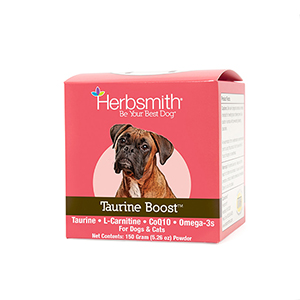
Energize Every Heart Beat with Taurine Boost
Taurine Boost is a veterinarian-developed formula to support cardiac health in dogs and cats. With L-carnitine, taurine, omega-3 fatty acids and coenzyme Q10, this formula is ideal to support heart health in breeds that are prone to cardiac stress. Taurine Boost may also be used to support normal heart function in dogs and cats as they age. In addition to supporting cardiovascular health, Taurine Boost may also be used to support immunity, brain health, and eye health.
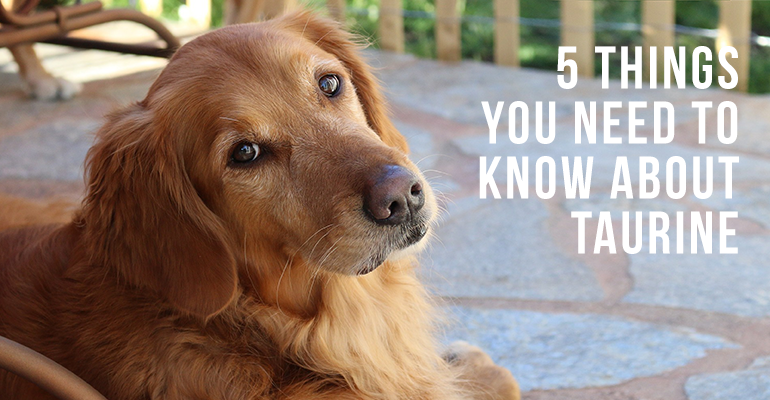
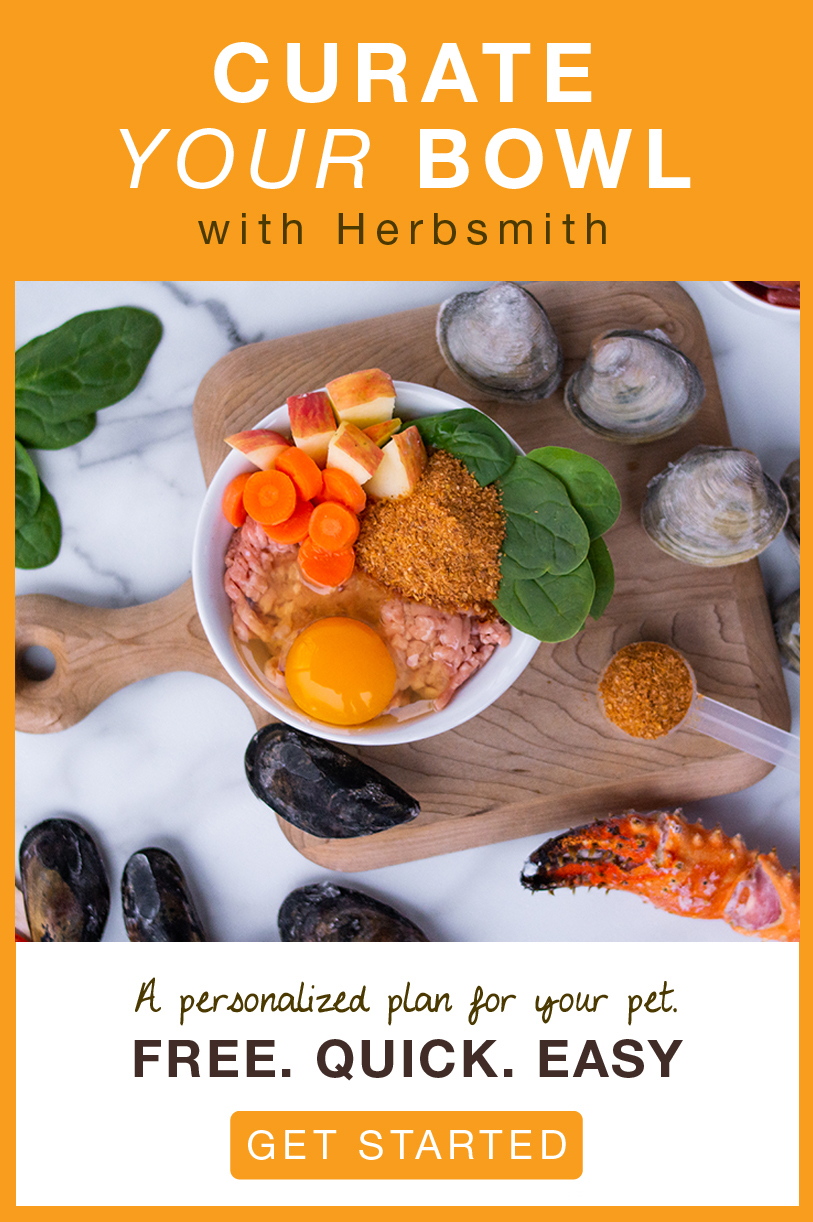


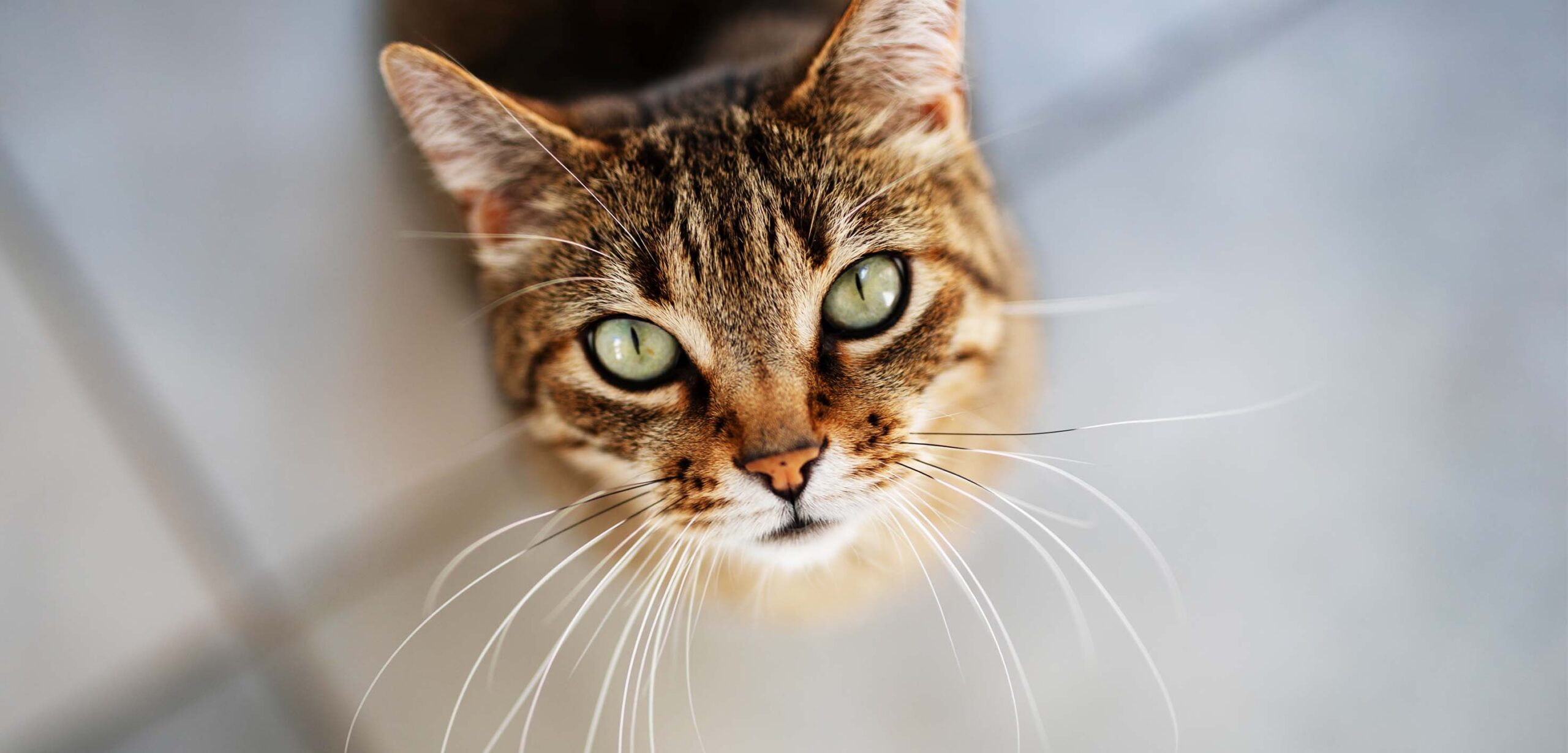
30 Responses
Do I still give omega 3 fish oil or krill because I cook 50% & kibble to supplement rest, when giving boost?
A dog seldom gets too many Omega-3 fatty acids and if he does, the Omega 3s are utilized by his body as energy. So, offering your dog several omega sources, like fish oil or krill, even with Taurine Boost is actually great!
Very helpful article about taurine
Found this so helpful, thank you!
Okay I feed acana lamb and apple they are say grain free blocks Taurine absorption Can I add this supplement to increase his absorption and keep Hercules on a Grain after diet
Hi Stacie,
Great question.
The theory that taurine absorption is being blocked by legumes is just one of many hypotheses in consideration at this point.
But, what’s worth noting is that with taurine supplementation, there was improved heart function in ALL cases, even without a change in diet.
You could certainly add Taurine Boost to support their heart health but what you may also consider is changing their diet or even adding in fresh or freeze-dried foods.
In the FDA’s findings, 87% of the reported cases were dry food which speaks to the quality of ingredients that kibble brands use as well as the processes used to make them. Dry dog foods are generally heavy on carbs (think starches or grains) because they’re needed to form the kibble. Most exceed 40-50% total carb content, in fact. And with higher carb content, there’s less room for the meat proteins that dogs need to thrive.
We’d recommend choosing a species-appropriate diet balanced for your scavenger carnivore; a diet that’s high in meat proteins (70-80% per recipe) and low in carbohydrates (25% max from fresh fruits, veggies, and seeds).
If you want to read more about what makes a carnivore a carnivore, I’ve included a link below.
https://simplefoodproject.com/carnivores/
my dogs cannot have fowl, grains etc. I just purchased ground rabbit and I’m in search for a dry food for small dogs (small bites) that will accommodate them. NO CHICKEN Do you have suggestions. I have not found any dry rabbit foods or venison without chicken meal.
Do I need to give them taurine too.
Hi Patti,
Taurine can only be found in high-quality meat proteins and is especially concentrated in nutrient-rich organ meats like the heart.
The Simple Food Project has recipes with 70-80% real, high-quality skeletal and organ meats, which as you can see below, have plenty of taurine.
Taurine levels**
Beef & Salmon – .12%
Duck & Trout – .14%
**Because there are no AAFCO standards regarding taurine levels for dogs, these taurine levels are compared to standards for cats, who as true carnivores, require more taurine than dogs.
Feeding quality, taurine-rich foods like wild-caught salmon, whitefish, grass-fed beef, organ meats like liver and heart will support your dogs’ heart health.
You could, of course, add Taurine Boost to provide targeted nutrition for the heart as well!
Can you suggest Taurine, Carnitine, CoQ10, EPA/DATE amounts or ranges, for total daily requirements per kg weight? Or any resources to find this info? I’m so frustrated I can’t find anything about how much to start with, and vets are totally uneducated about nutrition because they rely on pushing commercial foods! I know it isn’t an exact amount and may take some adjustment but I don’t want to start with too much (or so little it does nothing) and cause other imbalances or problems. Thanks!
Hi! First off, I wanted to say thank you for this article. It was very informative and helpful. I always want to do what’s best for my fur babies, so I truly appreciate this. I have been thinking of starting my girls on a half kibble, half homemade food diet. This just made me want to do so more. So my question is how much organ meat should a dog have per day to increase their taurine levels? I have a 10 pound and a 45 pound dog.
Hi! My pups cardiologist just recommended that we add taurine and l-carnitine to his diet as he has some mild rounding of his left ventricle. He’s about 20 lbs and she recommended 500 mg 2x per day of each. I’d like To use your supplement. It seems I would just do a little more than a teaspoon 2x per day, does that seem right?
My 6 month old golden is currently eating Canidae all life stages lamb recipe because of a suspected chicken allergy. Is it okay to start him on a taurine supplement now or is he too young? Apparently Canidae only has 0.02% “natural” taurine.
Hi Joy,
We’d be happy to send you that. You may also consider Taurine Boost because it offers Taurine, Carnitine, CoQ10, and Omega 3 all in therapeutic levels. The formula has everything dogs and cats need for heart health.
Hi Rebecca,
Thank you for your kind words. We’re grateful for readers like you who ask questions, do the research, and actively support your pets’ health & wellness. We’ve included a few resources for you so that you armed with the right tools if you do decide to dive into homemade diets.
Dr. Becker’s Real Food for Healthy Dogs and Cats: Simple Homemade Food by Beth Taylor and Karen Shaw Becker DVM
The Royal Treatment: A Natural Approach to Wildly Healthy Pets by Barbara Royal Dr.
The important thing is that you offer complete & balanced meals using high-quality proteins including those taurine-rich organs. If you are feeding 50/50 kibble/homemade, also be sure that the kibble has added taurine or consider adding Taurine Boost. That way, you’ll be providing them plenty of taurine to support their heart health.
Hi Ashley,
Thanks for writing in. Right you are.
Hi Jen,
Great question! It’s never too early to start. Taurine Boost was developed by Dr. Bessent specifically to support cardiac health in dogs and cats. It’s a blend of amino acids, nutrients, and antioxidants; everything your pup needs to energize his heart for years to come.
Hello, I’m feeding Honest Kitchen with turkey, sometimes the chicken. My question is Honest Kitchen says they add taurine to there food. Do I still need to supplement? My dog is a cavalier, so I’m already concerned with DMC. Can there be too much taurine in a diet? Thank you Debbie,
Hi Debbie,
Thanks for writing in! When it comes to breeds like your Cavalier, who are more prone to heart conditions, they may benefit from additional taurine supplementation.
You can add a can of sardines or clams to their evening meal once a week. Or, consider adding a supplement like Taurine Boost. Both would boost your pup’s intake of taurine, which helps strengthen the heart muscle as well as cardiac function. You could always do both as well because there is no such thing as too much taurine.
Hi,
My dog has 4/5 heart murmur. He was in cardiac failure but has been responding well to lasix, Enapril snd vetmetin. He is 13 . Is he too far gone to start him on this supplement or can it still make a difference?
Hi there, it can absolutely provide support! The amino acids, nutrients, and antioxidants in Taurine Boost were picked specifically to promote heart health. It is targeted nutrition for the heart.
One of my dogs (age 8) has an enlarged heart and is going through investigative procedures now. He is on a combination of vegetarian dog food and fish dog food. The other dog (age 2 1/2) is allergic to animal protein. He eats only vegetarian dog food. Both are std dachshunds. Is it safe to give them taurine boost supplement even if I do not have a diagnosis of DMC? It could be mitrovalve and problem or other.
Hello!
I have a 91/2 year old female Dobie. She produces to many lipase enzymes so she is on Royal Canin special diet ,which I am not happy about. She can not tolerate any meat at all except a tiny bit of dehydrated rabbit. She has been diagnosed now with DCM, heart murmur and arrhythmia. I give her several natural products for her heart. Would there be a problem combining this with them and do you think this could help her at this late age? She shows no outward signs of dcm, no coughing, panting, or out of breath, but her heart rate is around 160.
Thank you so very much!
Hi, I thought the information you provided said to use raw meats or just barely cooked to provide taurine to your dog. So I’m confused about using the additive Taurine Boost- isn’t it powder?
Hello Jayne! Thank you for reaching out! I passed this along to Dr. Bessent and she agrees that Taurine would absolutely be necessary for Dobie and safe to use along with the other natural products. 🙂 Please feel free to email in at info@herbsmithinc.com if you have any other questions.
Hello Victoria! Thank you for reaching out! Yes absolutely it would be safe a beneficial to use Taurine Boost for both of your pups! 🙂
Hello Laurie! That is correct it is beneficial to give a species-appropriate diet for your scavenger carnivore to ensure your pup gets all the nutrients they need from food alone, including Taurine. However, because there are no AAFCO standards regarding taurine levels for dogs, we compared our taurine levels to standards for cats, who as true carnivores, require more taurine than dogs. You also can’t give too much because it is an amino acid. 😊
Taurine boost is a great addition to any bowl though as it’s targeted nutrition for the heart! It’s a great idea to start puppies on it to promote a lifetime of healthy heart support.
Hi – I would like to add taurine to my dog’s food because eating grain-free early in life resulted in a heart murmur. However, I read that taurine is contraindicated in dogs with anxiety, which Lumen seems to have. Do you know anything about that?
Thanks,
Rai
Hello Rai! We have not heard of Taurine causing any sort of anxiety, but we do know it is great heart health especially for a dog with a heart murmur. We do have calming herbs if your dog is experiencing daily anxiety as well! CalmShen is used to balance emotional highs and lows. To provide anxiety relief CalmShen offers a calming blend of herbs that act as a gentle persuasion, helping maintain a sense of calm without drowsiness. Hope this helps you! 🙂 Best wishes!
Hi. Great article … 2 questions : my 14 year old Boxer X was on a raw meat diet. He just stopped eating it. I now cook him a combo of ground turkey, sweet and white potatoes, peas and lentils. Should I add taurine?
Secondly my 6 year old Boxer X had a ph issue with her urine and after having bladder stones removed was put on a vet prescribed diet – Royal Canine UC and canned Rénal E or D (we can use both). Essentially a vegetarian diet. Is this diet balanced for taurine or should I be adding to it ?
Taurine Boost is rich in amino acids, nutrients, and antioxidants that provide targeted nutrition for the heart. So, adding Taurine Boost to both of their bowls would be perfect to support the heart!
And a balanced raw diet is a fabulous option, but I did want to mention our sister company, The Simple Food Project. This is a freeze-dried raw, species appropriate food made with only 16 ingredients! The Project offers all the benefits of a raw diet and provides whole food nutrition in a convenient way. You can check that out at http://www.simplefoodproject.com
Comments are closed.